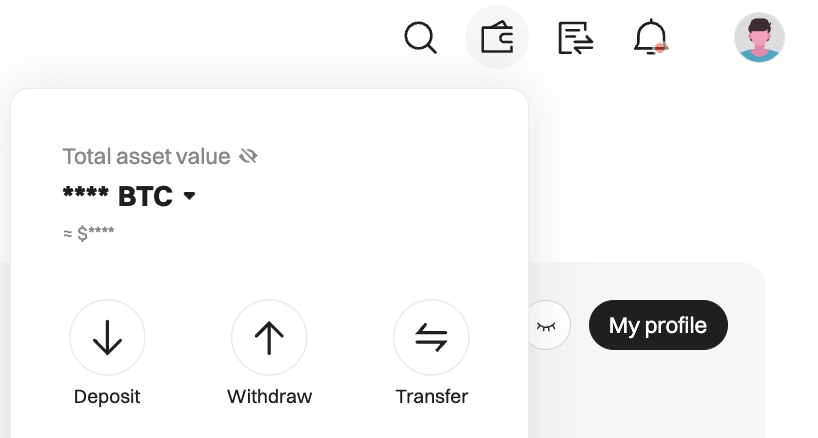
How to buy EOS (EOS) in American Samoa
Simple 3-step guide to buying EOS today in American Samoa
Step 1: Create a free account on the Bitget website or the app
Step 2: Place an order for EOS using a payment method of your choice:
Buy EOS with a debit/credit card
For Visa or Mastercard, select Credit/Debit card, then click Add New Card under the "Buy" tab Credit/Debit in the Buy Crypto tab of the Bitget app
Credit/Debit in the Buy Crypto tab of the Bitget app Credit/Debit in the Buy Crypto tab of the Bitget websiteSelect your preferred fiat currency, enter the amount you wish to spend, link your credit card, and then complete your payment with zero fees.
Credit/Debit in the Buy Crypto tab of the Bitget websiteSelect your preferred fiat currency, enter the amount you wish to spend, link your credit card, and then complete your payment with zero fees. Add a new card to complete your payment on the Bitget app
Add a new card to complete your payment on the Bitget app Enter your bank card details to complete your payment on the Bitget websiteFor Diners Club/Discover card, click Buy Crypto > [Third Party] in the top navigation bar to place your EOS order.
Enter your bank card details to complete your payment on the Bitget websiteFor Diners Club/Discover card, click Buy Crypto > [Third Party] in the top navigation bar to place your EOS order. How to buy crypto with credit/debit card
How to buy crypto with credit/debit cardBuy EOS with Google Pay or Apple Pay
Converting your Google Pay and Apple Pay balance into EOS is easy and secure on Bitget. Simply click Buy Crypto > [Third Party] in the top navigation bar to place your EOS order. How to buy crypto via third-party gateway
How to buy crypto via third-party gatewayBuy with bank transfer
We accept various payment methods, including iDeal and SEPA for EUR, PIX for BRL, PayID for AUD, UPI for INR, QRIS, DANA, and OVO for IDR, SPEI for MXN, and GCash for PHP. These services are facilitated by Alchemy Pay, Banxa, Mercuryo, and Simplex payment gateways. Simply select Buy Crypto > [Third Party] in the top navigation bar and select a fiat currency to place your EOS order.Buy EOS with the fiat balance in your Bitget account
You can Deposit fiat funds using Advcash, SEPA, Faster Payments, or PIX payment gateways to top up your Bitget fiat balance. Then, click Buy Crypto > [Cash conversion] in the top navigation bar to place your EOS order.P2P trading
With Bitget P2P, you can buy crypto using over 100 payment methods, including bank transfers, cash, and e-wallets like Payeer, Zelle, Perfect Money, Advcash, and Wise. Simply place an order, pay the seller, and receive your crypto. Enjoy secure transactions with escrow protection. How to buy crypto on Bitget P2P
How to buy crypto on Bitget P2P
Step 3: Monitor EOS in your Bitget spot wallet

Latest EOS news
View moreBuy EOS
Bitget—where the world trades EOS






FAQ
Can I buy $1 worth of EOS?
Can I buy $10 of EOS?
Where else can I buy EOS?
Where is the best place to buy EOS?
Should I buy EOS right now?
Buy EOS in a different country
An unincorporated territory of the United States of America in the Southern Pacific Ocean, American Samoa lies southeast of Samoa and is just one of two US territories sitting south of the equator. With just a population of 45,000 inhabitants, American Samoa spans 200 square kilometers, making it larger than the state of Washington DC.
The country itself is made up of five main islands and two coral atolls, making it the perfect destination for those looking for a tropical escape. From Fagatogo Market and the Fatu ma Futi rock formations to the Ofu Beach and Nu’uuli Falls, there’s plenty to see and do for nature lovers. Eco travelers can also come into close contact with turtles and sharks at Vaitogi.
The official currency of American Samoa is the US Dollar (USD), and with direct support from Bitget, you can purchase cryptocurrencies in just a matter of minutes, no matter where you are in the country, from Pago Pago or Tafuna to Leone and Faleniu. Our exchange offers a series of secure payment options to make trading easier for you, including P2P trading, crypto deposits, and other third-party merchants such as Apple Pay, Google Pay, and different credit card services.